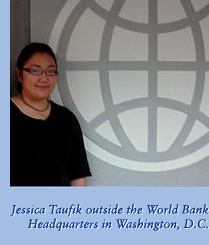


Leadership and Nation-building
The Third Annual Athgo Global Forum, organized in partnership with the World Bank and held in July at World Bank headquarters in Washington, D.C., revolved around the theme “Miracles of Development: Good Governance and Capacity Building.” According to Jessica Taufik, who was among more than 200 students, entrepreneurs and young professionals who attended the three-day forum, discussions focused on “corruption and a country’s ability to sustain leadership without corruption.” The speakers included U.S. Congresswoman Linda Sanchez, National Defense University Senior Research Professor Michael Baranick and World Bank officials.
Being able to listen to the perspectives of U.N. dignitaries, corporate executives and area experts on various pressing local and global issues was an educational journey. However, the most exciting part for her was the breakout session, which enabled participants — grouped into 10 teams — to develop business models and policy memoranda that addressed challenges posed by corruption, capacity building, governance and sustainability.

Taufik, a junior, was chosen to lead her group, which was composed of graduate students. She and a fellow group member from the London School of Economics and Political Science co-authored a policy memorandum on social entrepreneurship, specifically on the issue of agriculture in Uganda. The group’s project involved “lending seeds to Ugandan farmers to enable them to start up their farms and then requiring the borrowers to return a portion of the seeds to the lenders for subsequent availability to other farmers.” This process would not only generate a cycle of giving but also prevent corruption because seeds, instead of cash, would be the major resource.
“I’ve personally been passionate about African politics, especially colonialism,” Taufik explains. “Even after [gaining] their independence, these countries are still suffering.” As for choosing Uganda, she adds, “it has more civil flexibility and is more prone to accept foreign and external input” than other African nations.
Although each team had to submit a policy memorandum and a business proposal, only one of these would be eligible to compete for awards. Taufik’s policy memorandum, which was chosen to compete against other group’s memoranda/business proposals, won second place. “It came as a surprise because we weren’t expected to win. [The judges] tend to choose business proposals that generate profit,” she says. “In fact, the first- and third-place winners were business proposals.”

For Taufik, the policy memorandum was not only a group project but a program that she and her team strongly believe in as well. In addition, group members will be considered for a 10-year pilot phase to implement the proposal and travel to Uganda. “It’s a wonderful feeling to know that our work at the conference does not end there and is part of our development as future global leaders,” she states. “Since the conference, I’ve been in constant contact with student leaders from all over the world. It’s amazing because we are constantly bouncing ideas off each other about our theses and personal projects.” She also is further developing the memorandum and planning to apply to the World Bank Junior Fellow Program.

FDU Magazine Home | Table of Contents | FDU Home | MyFDU.net | Blog About It
©Copyright 2009 Fairleigh Dickinson University. All rights reserved.
For a print copy of FDU Magazine, featuring this and other stories, contact Rebecca Maxon, editor,
201-692-7024 or maxon@fdu.edu.